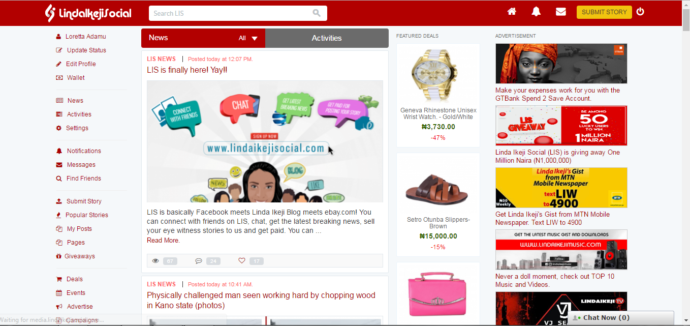If you’ve been on social media today, you’ve probably heard that our very own Aunty Linda has launched a “social networking website”, ingeniously called Linda Ikeji Social (she told us about it in this 10-minute video here).
According to her, LIS is what happens when Linda Ikeji Blog (LIB) meets Facebook at a bar and somehow end up having a baby together. Facebook’s genes must be dominant because this baby looks a lot like it – well, bar the red color.
Why it makes sense
Away from looks, LIS is “very different” from other social networking sites because users can interact with content from LIB off the bat. When you sign in, you are not greeted with an empty feed but a living, breathing news/gossip feed. Social networks are typically boring until you gain a following, but LIS will not have this challenge because beneath the social networking aspect of LIS is the already popular LIB feed.
Linda Ikeji could be onto something major with this model. Users can submit stories and get paid N1000 for every published article. That’s right. Aunty Linda will just sit back and relax and stories will just keep coming.
Fuck!!! Linda Ikeji has created a monster. She does not have to do the work anymore. Post the gist yourself and she collects advert money pic.twitter.com/5kw2Z3JnsS
— Victor Asemota (@asemota) November 1, 2016
This invariably means that the news feed will never run dry. Typical LIB posts + User-generated content = Content, all day, everyday. If this thing works, it will move beyond just a social media networking site to a publishing platform, not unlike Medium.
https://twitter.com/seyitaylor/status/793414427018158080
Let me backtrack a little and use an analogy I learnt in this article about pipes and platforms. Linda Ikeji Blog right now is a pipe. She produces content and publishes for her audience to consume. That is a linear flow of value, which, generally speaking, is unscalable.
Linda Ikeji Social looks like Linda Ikeji trying to build a platform. That is, enable interactions between value producers (users submitting posts) and consumers (the audience reading them). Aunty Linda will pay N1000 for every post and help “expose” it to a larger audience than each blogger would have been able to command. She’ll then sell ads on top of all that and…cha-ching. Her inventory is pretty full these days (bursting at the seams, almost) and this looks to me like an interesting way to grow.
There’s something even more interesting going on here. If you read her blog (like many Nigerians do), you’ll have noticed the people who are using the comments section as an e-commerce platform. LIS might be a way for Linda to “formalise” this activity. Product listings mean more page views per session, which means more ads clicked on, which means $$$.
If it gains enough traction, she could even ape OLX’s model by selling sponsored listings, etc.
Why it doesn’t
Managing platforms is hard. You’re not just catering to your users but managing the relationship between producers and users. This will require strategy that I doubt Linda has even considered. In the video, she said the idea for LIS came about when she met with two LIB readers who only visit Facebook and her blog. It’s highly likely that Linda Ikeji hasn’t even considered next steps beyond her initial idea.
To generate the initial user base that will ensure this baby bangs, Linda Ikeji came up with some sort of giveaway. Apparently, all registered users by November 8 will be able to get a portion of an already earmarked N1,000,000 for their efforts.
Social networks succeed by the number of active users as opposed to users that just signed up. Linda Ikeji has more or less figured out how to get users to sign up (albeit with some challenges) but there is no evident strategy to keep these users beyond the news feed on the homepage which is practically the same thing as visiting her blog. Even twitter is struggling, how does she hope to stay relevant?
On the technical side, LIS is nothing special. It appears that there is some controversy about the source code for Aunty Linda’s baby. LIS is essentially a clone of an open source social network project. In typical LI fashion, credits were never given but is anyone surprised?
Lol #lindaikejisocial is built on #Laravel and domain name provider is #godaddy @iamfunsho @unicodeveloper
— Var E.M.E™ ㄆㄞJULY6 (@dev_emeka) November 1, 2016
Maybe she will wait for the original developer of the app to add that feature first 😂 https://t.co/mf2SgX87ky
— Edem Kumodzi (@edemkumodzi) November 1, 2016
Added to that, her developers did not “finish work.” There are still some i’s to be dotted, and t’s to be crossed.
So, you launch a social site and didn't buy the dot social? You need to fire your web developer. pic.twitter.com/rMHpXZSo8O
— Victor Asemota (@asemota) November 1, 2016
At the end of the day, if all else fails, she would have successfully moved her LIB audience away from Blogger to her own platform.
Creating your own social media platform takes trailer loads of courage and I wish her all the best.























